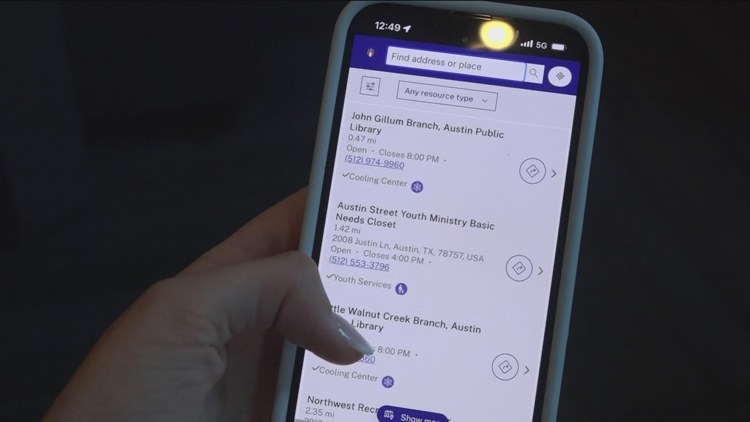
On Wednesday, the City of Austin’s Homeless Strategy Office launched a new digital platform called “Open Now” to connect unhoused residents to more resources in the community.
The digital platform has more than 100 different resources, including water fountains, heating and cooling centers, showers, storage, and even mental health resources. The map on the platform shows residents how close they are to resources and even connects them with directions to the location.
Charles Loosen, the Community Engagement Consultant with the HSO said they’ve been developing this platform for about a year, but have been talking about it for several, from hearing feedback from unhoused residents.
“Residents had really expressed a desire to get better information about existing resources that are readily available in the community,” Loosen said.
He said this platform would have been a huge help during emergency situations like the previous winter storms or extreme heat.
“We had a lot of fantastic partners who were publishing static hard copy lists, and that doesn’t always work, hours of operations change, service providers move locations,” Loosen said. “We wanted something that was more dynamic and could be updated on the fly.”
HSO officially launched the platform on Wednesday, but they are still asking for feedback on it from residents and service providers. Loosen said they plan to keep adding more resources in the coming weeks.
“We’re really excited to collect feedback from end-users and incorporate that so that we can continue to improve the app and ensure that it’s relevant,” Loosen said.
The digital platform is available through the web browser on any device like a phone, tablet, or computer.
What else is the Homeless Strategy Office up to?
On Wednesday, the HSO also gave an update to Austin City Council members on how operations are going at the Marshaling Yard emergency shelter that was opened two years ago.
Since 2023, the shelter has served 1,323 people and helped find permanent housing for 244 clients. They have a positive exit rate of 29%, which Greg McCormack, the program director for the HSO said is in line with their other shelters.
McCormack also highlighted some of the features at the shelter, including daily transportation that take residents to bus stops or appointments, laundry services, monthly Bookmobile visits, job service opportunities, and spaces for pets.
“As you guys know, many of the individuals we work with have pets and will not come into shelters without them,” McCormack said.
The Marshalling Yard also has nine housing case managers, which McCormack said is a major part of getting people back on their feet.
“Without case managers, people just are not going to get housed,” McCormack said.
During the meeting, Council Member Marc Duchen asked McCormack what the biggest challenges and needs are for the shelter at the moment, and he said it was making sure they have enough case managers and finding housing in Austin’s difficult housing market.
McCormack also ensured council members that they are constantly looking for alternate permanent shelters to replace this temporary one. He said they have been talking with The Other Ones Foundation about possibly getting an expansion of 100 beds by the end of the year, but he wants to make sure there’s a solution for the whole shelter first.
“We want to make sure that we don’t lose the beds at Marshalling Yard without replacing them,” McCormack said.






